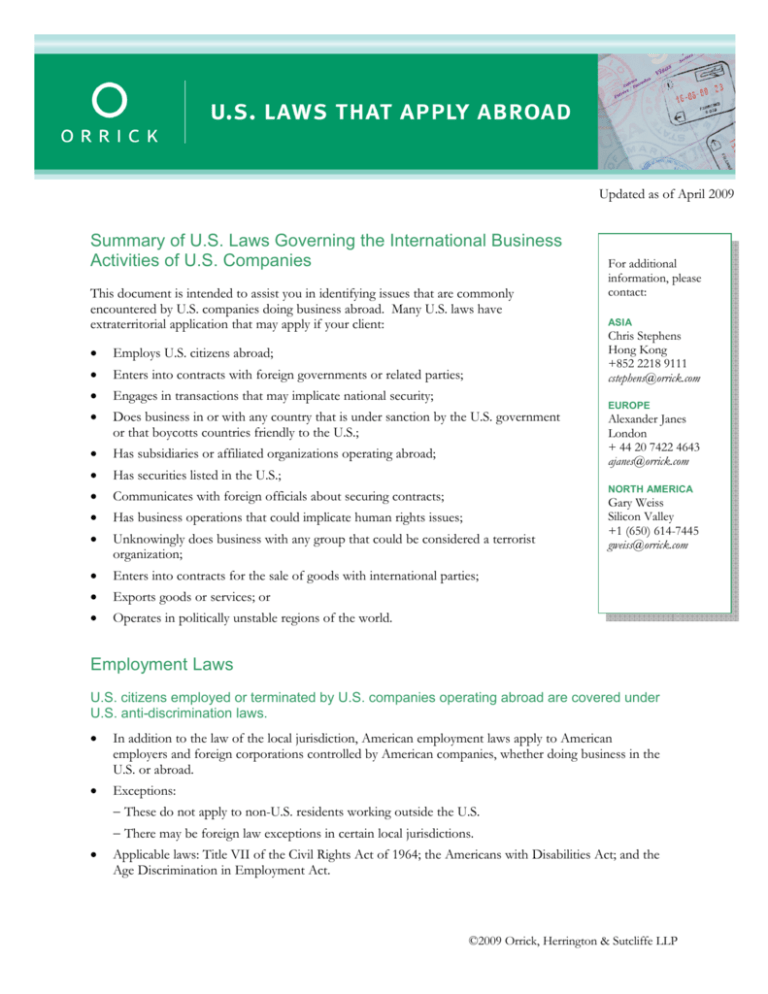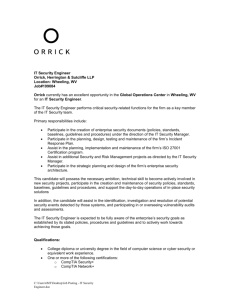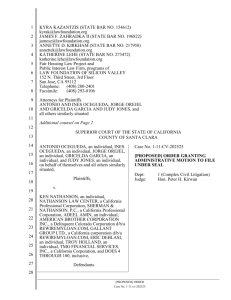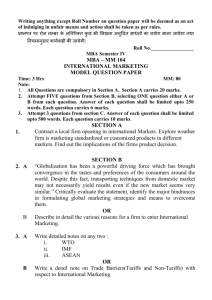
Updated as of April 2009
Summary of U.S. Laws Governing the International Business
Activities of U.S. Companies
This document is intended to assist you in identifying issues that are commonly
encountered by U.S. companies doing business abroad. Many U.S. laws have
extraterritorial application that may apply if your client:
·
Employs U.S. citizens abroad;
·
Enters into contracts with foreign governments or related parties;
·
Engages in transactions that may implicate national security;
·
Does business in or with any country that is under sanction by the U.S. government
or that boycotts countries friendly to the U.S.;
·
Has subsidiaries or affiliated organizations operating abroad;
·
Has securities listed in the U.S.;
·
Communicates with foreign officials about securing contracts;
·
Has business operations that could implicate human rights issues;
·
Unknowingly does business with any group that could be considered a terrorist
organization;
·
Enters into contracts for the sale of goods with international parties;
·
Exports goods or services; or
·
Operates in politically unstable regions of the world.
For additional
information, please
contact:
ASIA
Chris Stephens
Hong Kong
+852 2218 9111
cstephens@orrick.com
EUROPE
Alexander Janes
London
+ 44 20 7422 4643
ajanes@orrick.com
NORTH AMERICA
Gary Weiss
Silicon Valley
+1 (650) 614-7445
gweiss@orrick.com
Employment Laws
U.S. citizens employed or terminated by U.S. companies operating abroad are covered under
U.S. anti-discrimination laws.
·
In addition to the law of the local jurisdiction, American employment laws apply to American
employers and foreign corporations controlled by American companies, whether doing business in the
U.S. or abroad.
·
Exceptions:
- These do not apply to non-U.S. residents working outside the U.S.
- There may be foreign law exceptions in certain local jurisdictions.
·
Applicable laws: Title VII of the Civil Rights Act of 1964; the Americans with Disabilities Act; and the
Age Discrimination in Employment Act.
©2009 Orrick, Herrington & Sutcliffe LLP
Contracts with Foreign Governments or Related Parties (FSIA)
Contracts with foreign governments or related parties may be subject to sovereign immunity.
·
U.S. law provides for a general rule of immunity from suit against foreign states.
·
The definition of “foreign state” includes:
- Foreign states themselves, political subdivisions, agencies and instrumentalities thereof (e.g., national
investment authorities);
- Legal entities majority-owned by a foreign state formed under its laws; and
- Individuals acting in official capacity and third-party agents.
·
Exceptions to immunity include: waiver, commercial activities with nexus to U.S., rights in property
located in U.S., expropriation with a nexus to U.S., tortious conduct with a nexus to U.S., arbitration
disputes and state-sponsored terrorism.
·
Applicable laws: Foreign Sovereign Immunities Act (FSIA).
Transactions Involving Foreign Investors that May Implicate National
Security Interests (CFIUS, FINSA)
Any merger, acquisition or takeover that could result in foreign control of a U.S. business may
be reviewed by CFIUS prior to consummation.
·
The Committee on Foreign Investment in the U.S. (CFIUS) is an inter-agency committee that reviews
transactions that (i) involve foreign investors and (ii) may implicate national security interests.
·
Participants to a transaction that could result in foreign control of a U.S. business that potentially
implicates national security interests are encouraged to voluntarily submit an application to CFIUS prior
to consummation of a transaction.
·
CFIUS approval provides pre-clearance assurance and avoids the risk of a subsequent adverse holding by
CFIUS or the U.S. President.
·
The process entails a 30-day review, which may be followed by a further investigation of up to 60 days.
·
Applicable law: Foreign Investment and National Security Act of 2007 (FINSA).
Transactions with Declared Terrorist Groups
It is a crime for U.S. companies to give anything of value to any group listed on the U.S.
government’s terrorist list.
·
This may include organizations not commonly considered “terrorist” in nature (e.g., hospitals in the
West Bank).
·
Applicable laws: the current OFAC list of Terrorists is available at:
http://www.treasury.gov/offices/enforcement/ofac/programs/terror/terror.pdf
2
©2009 Orrick, Herrington & Sutcliffe LLP
Transactions with Nations Subject to Sanction (OFAC)
U.S. law prohibits most transactions with (i) nations under sanction by the U.S. government and
(ii) specially designated companies and individuals.
·
Federal law prohibits commercial and financial transactions between U.S. companies (and foreign firms
owned or controlled by U.S. companies) and selected foreign countries and designated nationals.
·
OFAC currently applies to the following sanctioned countries:
- Burma (Myanmar), Cuba, Iran, North Korea, Sudan and Syria.
- Lesser sanctions apply to Liberia, The Western Balkans and Zimbabwe.
- Each sanction is governed by a distinct set of regulations.
·
OFAC also applies to the individuals and companies included on the list of “Specially Designated
Nationals” available at: http://www.treas.gov/offices/enforcement/ofac/sdn/t11sdn.pdf
·
Penalties:
- A fine of up to $1,000,000 or up to 20 years in prison (for individuals), or both (per violation); and
- Seizure and forfeiture of goods.
·
Applicable law: Treasury Department’s Office of Foreign Assets Control (OFAC).
Improper Payments to Foreign Officials (FCPA)
U.S. companies (and foreign companies with securities listed in the U.S.) are subject to severe
penalties for making improper payments to officials of foreign governments.
·
U.S. companies and their employees:
- Are prohibited from giving or offering “anything of value,” monetary or otherwise, to any foreign
government official, political party, or candidate for political office, for the improper purpose of
influencing such person.
- Can be charged with violating FCPA based on the activities of their consultants, agents, joint venture
partners, or subsidiaries.
·
Companies whose securities are listed in the U.S. are required to maintain accurate books and records
and an effective system of internal controls.
·
Exceptions for:
- “Facilitating or expediting payments” to a foreign official made to secure or expedite performance of
lawful actions within the responsibility of the official, e.g., mail delivery or document processing.
- Payments that are lawful under the written laws and regulations of the country involved.
·
Penalties:
- $2,000,000 for a company; $100,000 or five years’ imprisonment for its officers and directors (per
violation). Note: recent aggregate fines have measured in the hundreds of millions of dollars;
- Mandatory loss of export privileges; and
- Debarment from participation in federal contracts.
·
3
Applicable law: the Foreign Corrupt Practices Act of 1977 (FCPA).
©2009 Orrick, Herrington & Sutcliffe LLP
Transactions with Countries Having Boycotts Against Countries
Friendly to the U.S.
U.S. companies are prohibited from complying with foreign countries’ boycotts against countries
friendly to the U.S.
·
These issues are most frequently encountered in connection with the Arab boycott of Israel, but can arise
anywhere. Currently the list of boycotting countries includes Bahrain, Kuwait, Lebanon, Libya,
Oman, Qatar, Saudi Arabia, Syria, United Arab Emirates, and Yemen.
·
U.S. companies (and their controlled foreign subsidiaries):
- Are prohibited from (i) complying with foreign countries’ boycotts against countries friendly to the U.S.
and (ii) providing information about business relationships with boycotted countries; and
- Must report1 (i) their operations in boycotting countries and (ii) any request they receive for
participation in a prohibited boycott or for prohibited information about their business relations.
·
Penalties:
- For the company: the greater of $1,000,000 and five times the value of the exports (per violation);
- For individuals: $250,000 or imprisonment for up to 10 years, or both (per violation);
- Loss of certain tax benefits;
- Denial of export privileges; and
- Seizure or forfeiture of goods.
·
Applicable laws:
- Export Administration Act; and
- Internal Revenue Code (Section 999).
Business Activities Affecting Human Rights (ATCA)
Under U.S. and international laws, corporations are responsible for protecting certain
human rights.
·
U.S. company are directly responsible for human rights that are affected by their business operations,
including slavery, genocide, certain war crimes, crimes against humanity, torture, forced labor, apartheid,
and forced disappearances.
·
U.S. companies are also indirectly responsible for aiding and abetting, or being complicit with, a
government in the violation of human rights, including murder, prolonged arbitrary detention, systematic
racial discrimination, and prolonged detention without charge.
·
Applicable laws: the Alien Tort Claims Act (ATCA).
1
4
Note: unlike other laws covered in this memo, the anti-boycott laws impose affirmative reporting requirements.
©2009 Orrick, Herrington & Sutcliffe LLP
Contracts for the Sale of Goods (CISG)
Contracts between the U.S. and foreign counterparties that relate to sales of goods may be
governed by an international treaty.
·
The U.S. has ratified the 1980 United Nations Convention on Controls for the International Sales of
Goods (CISG). This treaty applies to contracts for the sale of goods between parties residing in countries
that have ratified CISG (unless specifically excluded by the contract).
- For example, a clause in a contract for the sale of goods with a foreign counterparty residing in a CISG
contracting state that indicates that the contract will be “governed by the laws of New York” will result
in the contract being governed by CISG.
- Under Article VI of the U.S. Constitution, states are required to recognize U.S. treaties as the supreme
law of the land. The CISG is the law of each state.
Exports (BIS, DDTC, ITAR, EAR)
Exports of certain products (including data and services) may be required to be licensed or may
be completely prohibited.
·
U.S. export controls apply to:
- Goods and services; and
- Technology and technical data (including the knowledge to develop, produce and use the technology);
- “Dual use” items that are primarily used for commercial purposes but also have potential military,
proliferation or terrorist applications.
·
Broad concept of an “export”:
- Data can be considered as “exported” upon the visual inspection by foreign nationals of U.S. origin
equipment and facilities;
- May include the oral exchange of information in the U.S. or abroad;
- The sharing of certain technologies to foreign nationals in the U.S. who are not permanent U.S.
residents is deemed to be an export. Non-U.S. employees may require an export license.
·
U.S. law “follows” U.S. products: exports from one non-U.S. country to another can require a U.S.
export license.
·
Applicable laws and regulatory bodies:
- Computers, software and other technology products are monitored by the Bureau of Industry and
Security (BIS), which operates under the U.S. Department of Commerce. BIS regulates many exports
subject to controls, including.
- Controls are provided in the Export Administration Regulations (EAR). Relevant products are listed
on the “Commerce Control List.”
- “Defense articles and services” are monitored by the Directorate of Defense Trade Controls (DDTC),
which operates under the Department of State and controls the export of “defense articles” and
“defense services” listed in the International Traffic in Arms Regulations (ITAR).
·
Penalties:
- A fine of up to $1,000,000 or up to ten years in prison (for individuals), or both (per violation).
- The denial of export privileges; and
- Seizure and forfeiture of goods.
5
©2009 Orrick, Herrington & Sutcliffe LLP
Political Risk Insurance
Political risk insurance provides coverage for financial losses in foreign countries resulting from
unpredictable actions of the host government.
·
Risks that are typically excluded from general liability insurance but that can be covered by political risk
insurance include:
- Expropriation: government confiscation, expropriation or nationalization of the insured’s investment.
- Contract frustration: (1) host government’s failure to perform or (2) acts by host government that
prevent a private party from performing under contracts with the insured.
- Currency inconvertibility: host government’s acts that (1) prevent the insured from converting
payments made in host country currency to currency used by the insured or (2) prevent the insured
from transferring currency outside of the host country;
- Political violence: physical damage to or loss of property resulting from politically motivated acts of
violence, including terrorism, civil war and revolution.
- Wrongful calling of guarantees/non-honoring of guarantees: unfair or wrongful calling of a guarantee
by host government or failure of host government to honor its payment obligations.
·
Political risk insurance can be purchased from both private insurers and quasi-public insurers, such as the
Oversees Private Investment Corporation (OPIC); and the Multilateral Investment Guaranty Agency
(MIGA) (an arm of the World Bank Group)
Permission is granted to make and redistribute, without charge, copies of this entire document provided that such copies are
complete and unaltered and identify Orrick as the author. All other rights reserved.
IRS Circular 230 disclosure: To ensure compliance with requirements imposed by the IRS, we inform you that any tax advice
contained in this communication, unless expressly stated otherwise, was not intended or written to be used, and cannot be used, for
the purpose of (i) avoiding tax-related penalties under the Internal Revenue Code or (ii) promoting, marketing or recommending to
another party any tax-related matter(s) addressed herein.
This publication is designed to provide Orrick clients and contacts with information they can use to more effectively manage their
businesses and access Orrick's resources. The contents of this publication are for informational purposes only. Neither this
publication nor the lawyers who authored it are rendering legal or other professional advice or opinions on specific facts or matters.
Orrick assumes no liability in connection with the use of this publication.
Attorney advertising. As required by New York law, we hereby advise you that prior results do not guarantee a similar outcome.
2009 Orrick, Herrington & Sutcliffe LLP, 666 Fifth Avenue, New York, NY, 10103-0001, +1-212-506-5000.
6
©2009 Orrick, Herrington & Sutcliffe LLP






